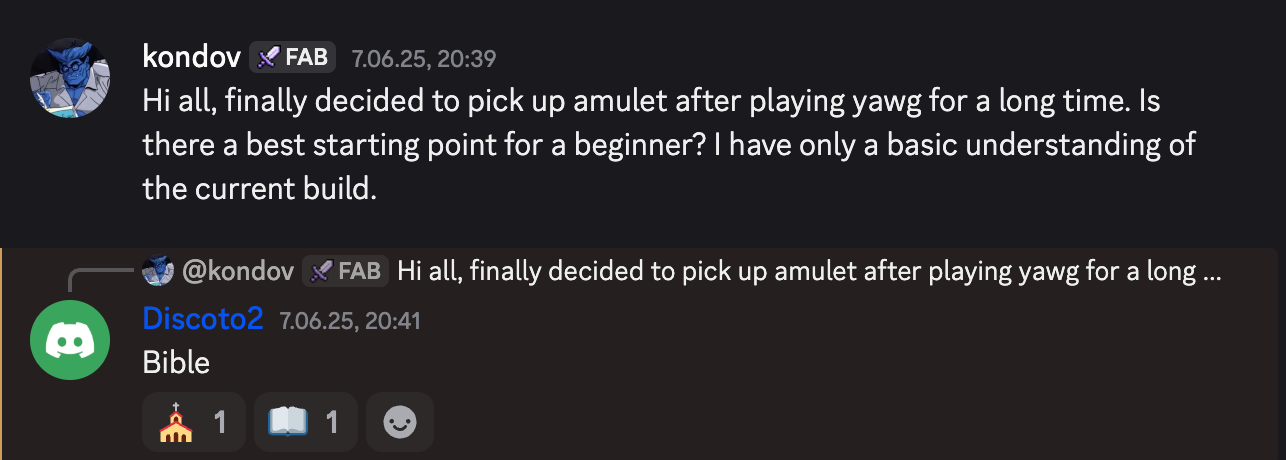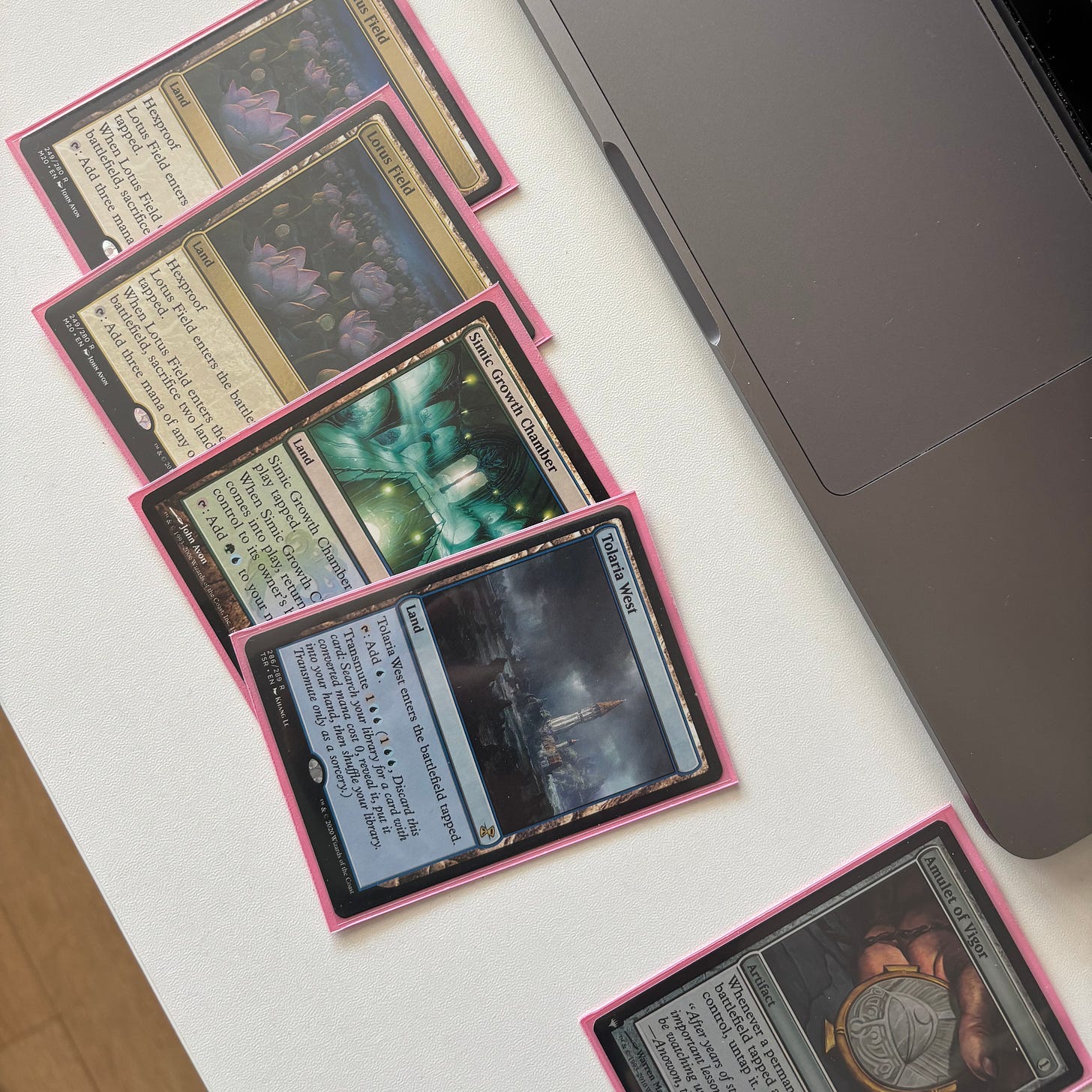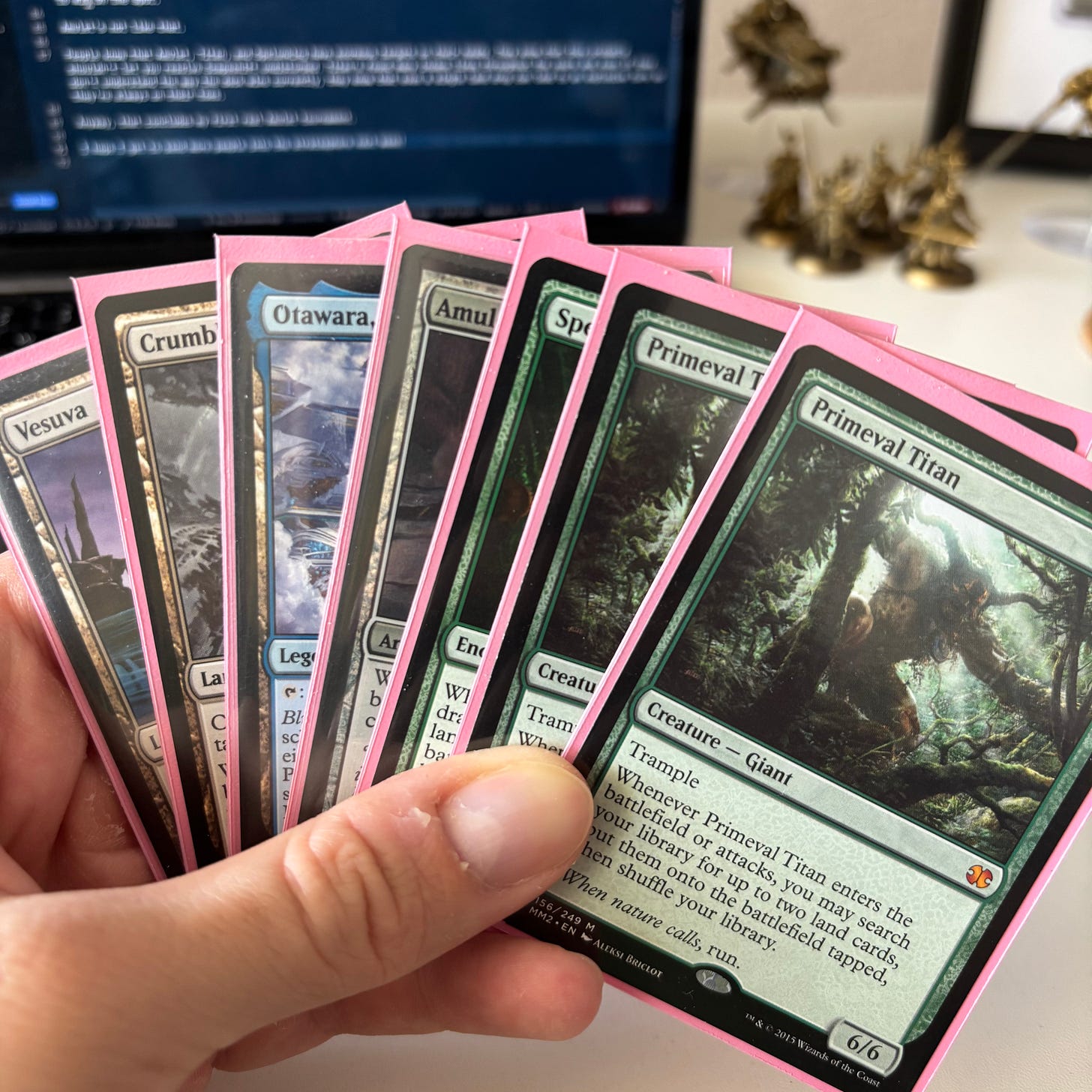I had a playset of Titans stocked up in my binder in case I ever grew the balls to play them, and in July 2025, I decided it was high time to get involved in some amulet shenanigans.
I didn't know much about the current state of the deck because I hadn't paired that often against it at tourneys, and our local titan player had hung up the gloves a little before Aftermath Analyst got released.
I knew it was incredibly powerful in the hands of someone who knew what to do with it, but looking at the lists, it wasn't exactly clear to me how resolving a Titan results in a win.
I looked at some modern lists and there was a haste land in them, sure, but I didn't see any Dryads, nor Valakut, not even the double strike land anymore. There's a Scapeshift, there's an Analyst there with which you can probably generate some mana with lands like Lotus Field. But how does this deck win?
I looked up the Titan Discord server so I could see if there's a beginner's guide for the deck, and this is the response I got:
The Bible they're referencing is a 100-page-long document written by Dominick Harvey in which he explains every detail, possible line, card choice, and interaction you can do with the deck.
I started reading it like I'd read any other book - cover to cover. But when I say that the guide covers everything, it truly does cover everything, including builds that are not currently used and corner cases you can come across in close games.
I needed to learn to walk before I started running.
So I got on YouTube and played the newest Titan MTGO league I could find. The player got to 4 lands with an Amulet on the field, played a Scapeshift... and their opponent scooped. The same thing happened in the next game. One person forced them to play through the combo and I paused on every new trigger, trying to understand what in god's name was happening in the MTGO UI.
Goldfishing
A piece of advice that helped me a lot was to goldfish the deck. Basically, draw out a hand and attempt to precisely execute the loops without shortcutting. Count your mana, make sure you've got the right colors, and ensure you can present a deterministic win to your opponent.
Normally, I prefer to test decks in a real environment, but when you get into the amulet combo, you're essentially playing solitaire, and if you're one mana off, you lose the game. The deck is incredibly punishing. I don't know how many times I managed to fail the loop even when I was playing the deck on my own.
I was beating myself on the regular.
So I kept the deck on my desk, and I'd just goldfish it whenever I had a few free minutes throughout the work day. I'd just grab the deck and attempt to go through the loops in the fastest way possible.
This helped me see the variance in some of the hands.
Your starting hand matters more than I thought. You need to have a plan for what you'll do with it - hoping to draw something or expecting to stumble on the combo doesn't really work.
I learned to recognize quick combos and turn 3 kills, but more importantly, I learned to recognize the trap hands. These are hands that look like they do something, but in fact, they don't do anything. A hand with multiple Grazers and Explores but no payoff is one example. If I have to draw both an Amulet effect and a payoff it doesn't matter if I'm ramping like crazy - I'm at the mercy of the top of the deck.
I had Dom Harvey's doc open at all times, and I'd go through parts of it whenever I messed up the loop. I learned how you need to plan your land sequencing because if you draw one of your combo lands and you don't have it in play when you start comboing, everything goes to hell.
First games against a real person
I was telling my friends about my aspirations to play Titan, and they invited me to a testing night at the LGS. I sleeved up the deck, got my favorite playmat, and sat down in front of my good friend, who happens to be an Azorius Control player.
I imagined that playing against control would be difficult, but I didn't know just how abysmal this matchup truly is.
He proceeded to counter everything I played, Solitude my titans, Ghost Quarters my lands with the bounce triggers on the stack, and Orim's Chant me when I attempted to combo off.
I think I won one game that entire night, and I'm sure he just let me have one because he felt bad for me.
I did some testing against prowess, and that matchup seemed like two ships passing by each other in the night.
It was a race to see if they could kill me before I found a combo. They have more tools in postboard games that could disrupt me, but I also board in 2-3 wipes so I think the match should be even.
The RCQ
My hands were itching to give Amulet a go in a tournament, and the first event in my LGS's calendar was an RCQ. Now, going straight to a 4-round competitive event with a deck like Titan is just begging for last place in the standings.
But you have to start somewhere - you win or you learn.
R1 - Affinity
I pair against the robots and get an insane start with 3 amulets. I play Scapeshift and generate more mana than the GDP of a small country, then present the loop. In game 2 he had a Tormod's Crypt, which I Boseiju'd in his endstep and went off with 2 Amulets the turn before he killed me.
R2 - Orzhov Blink
In the first game, I completely forgot that Solitude is a card and got blown out by it mid-combo. I've got no time to look through Dom's document, so I put in a Vexing Bauble to stop the elemental. Funny enough, I don't calculate my mana correctly, and I was 1 mana off in my combo turn because I forgot the Bauble will counter my own Pact.
This play makes me the Michael Jordan of fumbling combos.
R3 - Prowess
This went as I imagined. In game one, the Grazerz helped me to survive until I could play a Scapeshift and then gave him a recap of "Attack on Titan".
Game two was weird, though.
I opened up with an Amulet. He played Meltdown, destroyed the Amulet, and then decided to Surgical it. I think saving the Surgicals for the combo would've been better on his side, but the Amulet was such a tempting target that I can understand why he pulled the trigger.
Turns out my hand does nothing without an Amulet in this game, but he also kept his hand because of the hate pieces, so we played land-go for a few turns. I drew a titan and started putting in the pressure. He played a couple of Coris, but I drew a second titan, made a copy with Mirrorpool, and swung with all of them. Boseiju and Otawara in hand were good enough combat tricks to get me the W.
R4 - Neoform
Now, I had been away from the competitive Modern scene for a while, and I wasn't prepared for the beating this deck gave me. He countered my Amulets, Boseiju-ed my Spelunkings, and did his thing before I could get a Titan on the board.
I wasn't too hopeful after seeing his mainboard Consign to Memory and Pacts, but I managed to pull an insane win from out of nowhere.
He had a slower hand, and after taking damage from his fetches, shocks, and a Griselbrand activation, he's standing at 6 life. I have a Spelunking on board and play a Scapeshift. He Otawaras my Spelunking in response, and for the first time I have to think on my feet because this wasn't in the doc.
In the first moment, I think it's once again over, but I haven't made my land drop for the turn, so there's a narrow way through. I get all my Vestiges, float 4 mana, play my Spelunking again, play a Lotus and a bounce land, and cast a titan. Then get the haste land and kill him to take the game.
In Game 3, I kept an incredible hand, but he had just as many answers as I had questions. We run out of cards and play land-go until we run out of time and end up with a draw.
Reflections
It was cool to see how Titan went from a mystery of a deck to something I can now start to understand. I'm starting to have opinions about the hands I keep, the lines I take, the lands I find.
So far, I like Scapeshift a lot because it feels like an "I win" button with an Amulet effect on the field. Playing a Titan without a sure way to combo is still a bit confusing because I'm not sure how to build up to the loop.
I realize I was incredibly lucky this tournament by not having to fight through hate, and it will only get harder as I start frequenting locals with the same deck.
Before Titan, I played Yawgmoth, and even though both decks classify as "combo" they're quite different.
Yawg has a pretty solid mid-range plan that can lull the opponent into playing a fair game, then combo them unexpectedly when they tap out. It has many lines, so you can mask your intentions by heading in one direction and then making a sharp turn. You can put a Cauldron out, attempt to exile a combo creature, and when they respond, Chord for the missing piece to win on the spot.
Amulet's not like that.
Amulet, Titan, and Spelunking have enormous targets on their heads. People know they shouldn't let you resolve Scapeshift undisturbed. Titan's found many insane lines throughout the years, and even if your opponents don't understand the way the deck wins currently, they know that even a single land drop can lead to an explosive turn, so they're always on their toes.
Anyway, that concludes my first real Amulet tournament.
I hope I get to send more people into the stratosphere next week!





